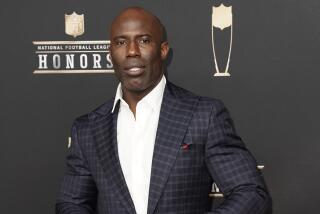In China, the United Airlines incident unleashes frustration about treatment of Asians in America

A passenger was dragged out of a United Airlines plane due to the airline overbooking the flight, creating yet another PR nightmare for United Airlines.
- Share via
Reporting from Beijing — Outrage over United Airlines’ violent removal of a passenger in Chicago has crossed the Pacific, extending the company’s public relations fiasco to one of its most crucial international markets.
The haunting cellphone video, which shows an Asian man hurled from his seat and dragged off a flight Sunday, inundated Chinese social media Tuesday and evoked tens of thousands of livid responses.
Viewers picked up on translated comments from a fellow passenger that suggested the unidentified man thought he was selected “because I’m Chinese.”
Many accused the company of racism and urged customers to stop booking flights on United. The topic drew 110 million readers on Weibo, a Chinese rival to Twitter, and more than 72,000 comments. Petitions to boycott the airline circulated on the popular social media app WeChat.
“Why are Chinese being bullied everywhere?” said one user on Weibo, where it became the day’s most popular topic.
The Communist Party-run newspaper, People’s Daily, displayed photos of the passenger’s blood-spattered face and reprimanded the airline for not doing more to vilify such treatment.
United did not immediately respond to requests for comment.
The company has said it asked the man and three others to leave an overbooked flight to Louisville, Ky., when no one else volunteered. He refused to move, so employees called police.
United Chief Executive Oscar Munoz referred to the incident as “upsetting” on Monday and apologized for “having to re-accommodate these customers.” He said the airline was reviewing employees’ conduct.
Passenger Jayse Anspach, in a Twitter post, said the man identified himself as a doctor and indicated he needed to work at the hospital the next day.
People’s Daily called it “gravely disappointing” that the airline “mentioned nothing of the violence against the Asian passenger.”
The backlash here is potentially wounding for a company that lauds itself as the “top U.S. carrier to China.” United launched its fifth nonstop flight to mainland China in summer, from San Francisco to the tech hub of Hangzhou. It also offers nonstops to Beijing, Shanghai, Chengdu, Xi’an and Hong Kong.
This marks the second social media controversy for the airline in less than a month. A gate agent barred two girls from a flight in March because they were wearing leggings. Their attire violated dress code for people who fly under a friends-and-family program of United employees. Social media users called the policy sexist and outdated.
But the most recent episode touched on a deeper anxiety in China, unleashing a reservoir of frustration about behavior toward Asians and the seemingly contradictory actions of a nation that preaches human rights.
“The security guy beat him until his face is covered in blood. Is this the so-called American democratic society?” one Weibo user asked.
Another scolded the U.S. for promoting itself as the “most democratic and advanced country in the world, but at the same time doing so many anti-human things against other countries!”
Still others used the moment to underscore the challenges faced by Asian communities in the U.S.
“Many Chinese have experienced racial discrimination and they never dare to say it aloud because of losing face,” said Joe Wong, a popular Chinese American comedian. “As a consequence, most mainstream Western media and the public underestimate the discrimination against Asians.”
More than 10,000 people shared his post.
Johnny Gaochao Zhang in the Times’ Beijing bureau contributed to this report.
ALSO
United Airlines suffers more bad publicity after a passenger is dragged from an overbooked plane
United Airlines says customers are ‘welcome’ to wear leggings — unlike teens who used special passes
More to Read
Inside the business of entertainment
The Wide Shot brings you news, analysis and insights on everything from streaming wars to production — and what it all means for the future.
You may occasionally receive promotional content from the Los Angeles Times.










